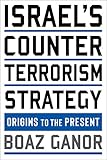Israel's Counterterrorism Strategy : Origins to the Present / Boaz Ganor.
Material type: TextSeries: Columbia Studies in Terrorism and Irregular WarfarePublisher: New York, NY : Columbia University Press, [2021]Copyright date: 2021Description: 1 online resourceContent type:
TextSeries: Columbia Studies in Terrorism and Irregular WarfarePublisher: New York, NY : Columbia University Press, [2021]Copyright date: 2021Description: 1 online resourceContent type: - 9780231199223
- 9780231553001
- 363.1/6095694 23
- online - DeGruyter
| Item type | Current library | Call number | URL | Status | Notes | Barcode | |
|---|---|---|---|---|---|---|---|
 eBook
eBook
|
Biblioteca "Angelicum" Pont. Univ. S.Tommaso d'Aquino Nuvola online | online - DeGruyter (Browse shelf(Opens below)) | Online access | Not for loan (Accesso limitato) | Accesso per gli utenti autorizzati / Access for authorized users | (dgr)9780231553001 |
Frontmatter -- CONTENTS -- ACKNOWLEDGMENTS -- CHRONOLOGY -- INTRODUCTION -- Chapter One. THE ISRAELI COUNTERTERRORISM STRATEGY AND DECISION-MAKING PROCESS: Conceptual Models -- Chapter Two. THE “FEDAYEEN PHENOMENON”: The David Ben-Gurion and Moshe Sharett Administrations (1948–63) -- Chapter Three. PALESTINIAN NATIONAL TERRORISM AFTER THE SIX-DAY WAR: The Levi Eshkol and Golda Meir Administrations (1963–73) -- Chapter Four. CROSS-BORDER TERRORISM AFTER THE YOM KIPPUR WAR: The Yitzhak Rabin Administration (1974–76) -- Chapter Five. TERRORISM AGAINST THE BACKDROP OF THE LEBANON WAR: The Menachem Begin, Yitzhak Shamir, and Shimon Peres Administrations (1977–86) -- Chapter Six. THE FIRST INTIFADA AND ACTIVITIES OF THE PALESTINIAN ISLAMIST ORGANIZATIONS: The Yitzhak Shamir Administration (1987–91) -- Chapter Seven. COUNTERING TERRORISM DURING THE PEACE PROCESS: The Yitzhak Rabin Administration (1992–96) -- Chapter Eight. A PRIME MINISTER’S ASSASSINATION AND SHIFTING COUNTERTERRORISM STRATEGIES: The Benjamin Netanyahu Administration (1996–99) -- Chapter Nine. CONFRONTING THE AL-AQSA INTIFADA: The Ehud Barak and Ariel Sharon Administrations (1999–2004) -- Chapter Ten. DISENGAGEMENT FROM GAZA AND ITS RAMIFICATIONS: The End of the Sharon Administration and the Ehud Olmert Administration (2005–2008) -- Chapter Eleven. CHANGES IN THE GREATER MIDDLE EAST: The Netanyahu Administration (2009–18) -- Chapter Twelve. ISRAEL’S COUNTERTERRORISM POLICY FROM THE PERSPECTIVE OF ISRAELI DECISION MAKERS -- CONCLUSION. The Art of Israeli Counterterrorism -- APPENDIX -- NOTES -- SELECTED BIBLIOGRAPHY -- INDEX
restricted access online access with authorization star
http://purl.org/coar/access_right/c_16ec
Since declaring independence in 1948, Israel has been involved in an intractable conflict with the Palestinians and its neighbors. While violence has ebbed and flowed over the years, the threat of terrorism has remained a constant factor, shaping Israeli security policy in a unique way.Boaz Ganor provides an authoritative analysis of Israel’s approach to counterterrorism throughout its existence. Drawing on unprecedented access to Israeli leaders, he offers a comprehensive insider’s account of the decision-making processes, challenges, and dilemmas at the core of counterterror activities. Beginning with infiltration attacks from neighboring states immediately after independence and proceeding through the formation of organized Palestinian terror organizations up to the present day, this book details distinct eras of terrorism and how the Israeli state has counteracted them. Ganor also highlights the dynamic nature of both terrorism and counterterrorism: Just as waves of terror rise, fall, and evolve, so too do the measures employed to respond to them. He distills the lessons of Israel’s experience into key tenets for other countries facing the challenge of terrorism.The book features revelatory personal testimony from senior Israeli decision makers who have played pivotal roles in counterterrorism strategy, including prime ministers, defense ministers, Israeli Defense Forces chiefs of staff, and directors of Mossad and Shin Bet. Israel’s Counterterrorism Strategy is indispensable reading for students, scholars, and practitioners alike.
Mode of access: Internet via World Wide Web.
In English.
Description based on online resource; title from PDF title page (publisher's Web site, viewed 20. Nov 2024)


